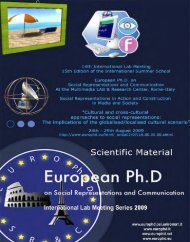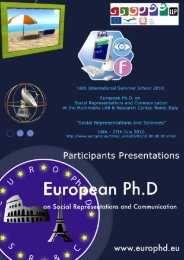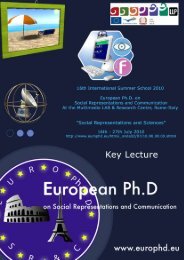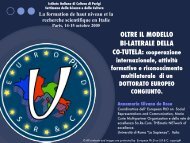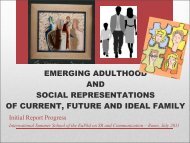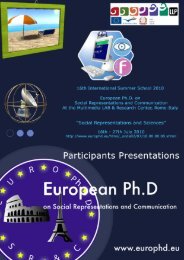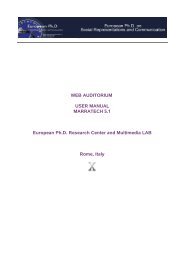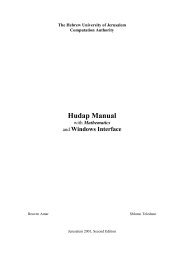The "boomerang" effect of the radicalism in discourse analysis
The "boomerang" effect of the radicalism in discourse analysis
The "boomerang" effect of the radicalism in discourse analysis
Create successful ePaper yourself
Turn your PDF publications into a flip-book with our unique Google optimized e-Paper software.
<strong>The</strong> consequences that <strong>the</strong> <strong>radicalism</strong> <strong>of</strong> this relativistic position leads to will be<br />
discussed fur<strong>the</strong>r on <strong>in</strong> this paper. Here we <strong>in</strong>tend to conclude this <strong>in</strong>troductive scenario by<br />
recall<strong>in</strong>g some positions taken <strong>in</strong> relation to <strong>the</strong> critical frenzy aga<strong>in</strong>st <strong>the</strong> RDA by authors<br />
<strong>in</strong>spired by <strong>the</strong> T.S.R..<br />
It is necessary above all to note that <strong>the</strong> polemic ve<strong>in</strong>, manifested by <strong>the</strong> authors <strong>of</strong> <strong>the</strong><br />
RDA concern<strong>in</strong>g <strong>the</strong> SRT, has aroused more reactions <strong>of</strong> surprise and astonishment than<br />
<strong>of</strong> vehement counter-attack by those researchers who feel implicitly referred to on account<br />
<strong>of</strong> <strong>the</strong>ir <strong>the</strong>oretical-methodological options based on <strong>the</strong> SRT, or more explicitly, are<br />
unrecognised or rendered illegitimate regard<strong>in</strong>g <strong>the</strong> accuracy <strong>of</strong> <strong>the</strong>ir researches, especially<br />
at methodological level - both for <strong>the</strong> scanty treatment <strong>of</strong> <strong>the</strong> problems <strong>of</strong> us<strong>in</strong>g<br />
<strong>in</strong>vestigation techniques and for <strong>the</strong> <strong>in</strong>terpretation <strong>of</strong> <strong>the</strong> results, not always reasoned<br />
<strong>in</strong>s<strong>of</strong>ar as <strong>the</strong> contextual dynamics <strong>of</strong> <strong>in</strong>ter-action between subjects <strong>of</strong> <strong>the</strong> <strong>in</strong>vestigation and<br />
researcher are concerned (emblematic <strong>in</strong> this respect is <strong>the</strong> rebuttal <strong>of</strong> <strong>the</strong> research <strong>of</strong><br />
Wagner, Duveen, <strong>The</strong>mel and Verma, 1999, by Potter and Edwards, 1999).<br />
Only recently - and precisely start<strong>in</strong>g from <strong>the</strong> article just mentioned by Potter and<br />
Edwards, 1999 - a more decisive reply was given by Ivana Markova (2000) <strong>in</strong> <strong>the</strong> same<br />
review Culture & Psychology with <strong>the</strong> <strong>in</strong>tention <strong>of</strong> clear<strong>in</strong>g up a series <strong>of</strong><br />
misunderstand<strong>in</strong>gs <strong>of</strong> <strong>the</strong> epistemological assumptions at <strong>the</strong> base <strong>of</strong> SRT by <strong>the</strong> RDA.<br />
“<strong>The</strong> Potter & Edwards article conta<strong>in</strong>s a number <strong>of</strong> <strong>in</strong>correct and mislead<strong>in</strong>g claims. I take <strong>the</strong><br />
opportunity <strong>in</strong> this discussion <strong>of</strong> <strong>the</strong>ir article to expla<strong>in</strong> <strong>the</strong> dialogical and dialectic nature <strong>of</strong> <strong>the</strong> <strong>the</strong>ory <strong>of</strong><br />
social representations and to clarify some <strong>of</strong> its ma<strong>in</strong> concepts. (...) One wonders why some <strong>of</strong> <strong>the</strong> <strong>the</strong>ory’s<br />
fiercest opponents have based <strong>the</strong>ir careers for 15 years, as Potter & Edwards (1999) declare <strong>the</strong>y have, on<br />
refut<strong>in</strong>g it. <strong>The</strong>ir criticism range from that which sees some merit <strong>in</strong> <strong>the</strong> <strong>the</strong>ory, to that which construes it as a<br />
vague and a perceptual-cognitivist <strong>in</strong>formation-process<strong>in</strong>g approach, and which attributes to <strong>the</strong> <strong>the</strong>ory<br />
properties which it does not have. (...)<br />
First <strong>the</strong> critics <strong>of</strong> <strong>the</strong> <strong>the</strong>ory <strong>of</strong> social representations confuse different levels <strong>of</strong> scientific explanation,<br />
<strong>in</strong> particolar with respect to what <strong>the</strong>y call 'perceptual cognitivism' and '<strong>in</strong>formation process<strong>in</strong>g'. Second , and<br />
more importantly , <strong>the</strong> <strong>the</strong>ory <strong>of</strong> social representations <strong>in</strong> Moscoviciís formulation (which may not be so <strong>in</strong><br />
o<strong>the</strong>r k<strong>in</strong>ds <strong>of</strong> formulation) belongs to a broadly conceived family <strong>of</strong> <strong>the</strong>oretical approaches which are<br />
underl<strong>in</strong>ed by dialogical epistemology.”<br />
(Markova, 2000, p. 419-420)<br />
O<strong>the</strong>r authors (de Rosa, 1994, de Rosa and Farr, <strong>in</strong> press) have underscored <strong>the</strong><br />
tautology implied <strong>in</strong> <strong>the</strong> affirmation that forms <strong>the</strong> very basis <strong>of</strong> <strong>the</strong> RDA, "all is action,<br />
namely <strong>discourse</strong>, <strong>in</strong> its every expressive form".<br />
“<strong>The</strong> extreme consequence <strong>of</strong> <strong>the</strong> <strong>discourse</strong> <strong>analysis</strong> <strong>the</strong>orist's <strong>the</strong>sis is <strong>the</strong> tautological identification<br />
between <strong>the</strong> <strong>discourse</strong>, <strong>the</strong> reality and <strong>the</strong> subjects: a perspective which implicitly adopts an ontological and<br />
dogmatic presupposition based on <strong>the</strong> religious statement “In <strong>the</strong> beg<strong>in</strong>n<strong>in</strong>g was <strong>the</strong> Word” (Word = God).”<br />
(de Rosa & Farr, <strong>in</strong> press)<br />
“From this po<strong>in</strong>t <strong>of</strong> view all social psychological processes resolve <strong>the</strong>mselves <strong>in</strong>to <strong>the</strong> <strong>effect</strong>s <strong>of</strong><br />
<strong>discourse</strong>, and <strong>the</strong> fleet<strong>in</strong>g achievements and reformulations <strong>of</strong> identity which it susta<strong>in</strong>s. It is <strong>the</strong> activity <strong>of</strong><br />
<strong>discourse</strong> alone which can be <strong>the</strong> object <strong>of</strong> study <strong>in</strong> this form <strong>of</strong> social psychology, and any talk <strong>of</strong> structure<br />
and organisation at <strong>the</strong> cognitive level appears as a concession to <strong>the</strong> hegemony <strong>of</strong> <strong>in</strong>formation-process<strong>in</strong>g<br />
model.”<br />
(Duveen, 2000, p.17)<br />
8




